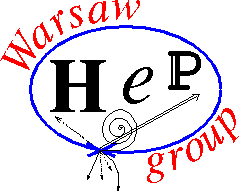SEMINARIUM FIZYKI WIELKICH ENERGII
Dnia 27 października (piątek) o godzinie 10:15, w sali B2.38 odbędzie się seminarium, na którym zostanie wygłoszony referat pt.:
„Second ECFA Workshop on e+e– Higgs/Electroweak/Top Factories”
Referuje: prof. dr hab. Aleksander Filip Żarnecki (IFD UW)
Second ECFA Workshop on physics and detectors for future e+e– Higgs/Electroweak/Top Factories took place two weeks ago in Paestum, Italy. I will report on the mandate, recent activities and plans of the ECFA study. In particular, I will present the so called Focus Topics, which were proposed to stimulate new activities in the field, covering both theory and experiment, analysis and algorithm development, as well as detector requirements and design optimisation. Selected results presented at the workshop will be discussed.
Serdecznie zapraszamy
dr hab. Katarzyna Grzelak
prof. dr hab. Jan Królikowski
prof. dr hab. Aleksander Filip Żarnecki

